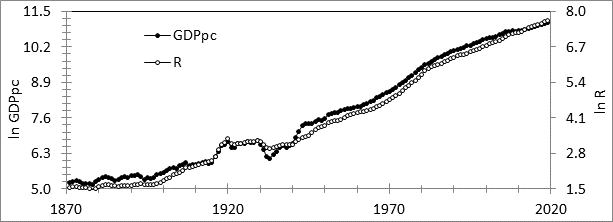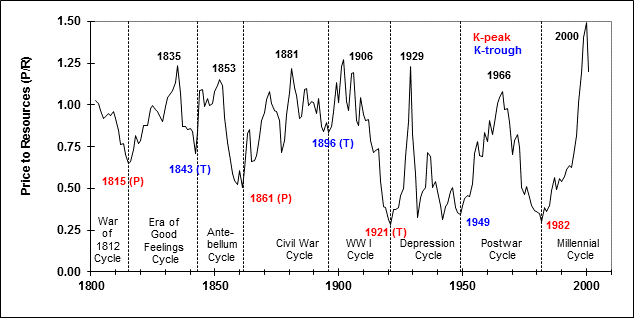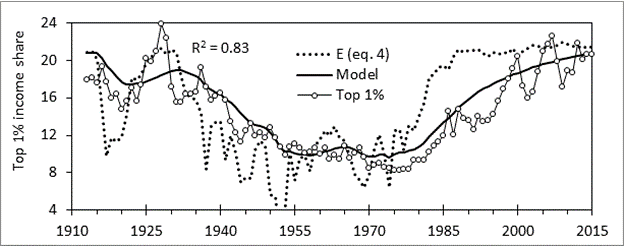Home › Forum › Political Economy › Is capital finance and only finance? › Reply To: Is capital finance and only finance?
I have some quibbles with these definitions. Capital is defined financially, in terms of market capitalization. Capital has a second definition as the means of production. Put another way, we can say, the “resources employed by businessmen to produce a profit”. This is the definition I gave to what I called Business Resources or R. R is also defined as the cumulative sum of retained earnings on the S&P 500 in constant dollars plus the real value of the index in 1871, when data becomes available. To the extent that the S&P500 index is representative of the economy as a whole, R can function as a proxy for the amount of real capital in the economy. This figure shows a plot of R and per capita GDP since 1871.

With R representing the “real capital”, and the price of the index representing “financial capital” one can relate the two in terms of the ratio P/R. This is the financial value for capital compared to real value for capital and could be used as a tool for determining how over or under valued the market is at any point in time. Such a plot shows range-bound behavior for two centuries.

In recent years P/R has risen above its previous high in 2000 which is either indicative of a massive bubble that will correct downward at some point, or an entirely new mode of capitalist operation. I note that the concept of capital as R is essentially the same as the Marxian notion of capital as the means of production.
Now a main point of my book is that capitalism is a cultural construct (like everything else in the human world) and evolves just like other kinds of culture. So on can apply the methods of cultural evolution as developed by Boyd, Richerson, Henrich, and others to evolution of capitalism. I use a very simplified model involving two kinds of capitalism, shareholder primacy (SP) and stakeholder capitalism (SC). The first uses the financial definition of capitalism, while the second uses the Marxian one. Which one you get depends on the economic and business environment. An environment of low marginal tax rates on income, low tariffs, inflation control using interest rates, legal stock buybacks, such as we have had since the 1970’s, selects for the SP variant. An environment of high marginal tax rates, high tariffs, fiscal inflationary control, and illegal stock buybacks selects for the SC variant. I use a measure of income inequality (top 1% income share) as a proxy for the amount of SP capitalism. Using a cultural evolutionary model I got from Boyd and Richerson’s primer on the topic I obtain this result when fitting inequality data to the model

Here “E” refers to the environment in which capitalist evolution is taking place. It is a function of policy set by the state: here represented as a linear function of top tax rate and labor power (measured by strike frequency). The heavy black line is the cultural evolutionary response to the changing environment E, and the open symbols is top 1% income share used as a proxy for amount of SP culture versus SC culture.
